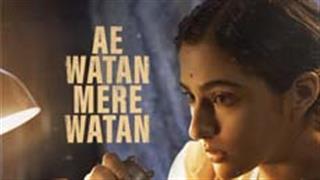Cast: Sara Ali Khan, Sachin Khedekar, Emraan Hashmi, Abhay Verma, Sparsh Shrivastav, Anand Tiwari, Aditi Sanwal, Alexx O'Neil, Benedict Garrett
Director: Kannan Iyer
Rating: **1/2
The depiction of Usha Mehta's story in Ae Watan Mere Watan was met with mixed reactions, primarily due to the portrayal of the central character by Sara Ali Khan. Let's delve deeper into the critical aspects of the film and the challenges it faced in capturing the essence of a historical figure like Usha Mehta.
Examining the Storytelling and Execution
While the premise of Ae Watan Mere Watan held promise, the execution fell short of expectations. The film aimed to shed light on lesser-known heroes of India's freedom struggle, with a focus on Usha Mehta's contributions during the Quit India Movement. However, the pacing of the narrative was criticized for being sluggish, failing to evoke the emotional intensity expected from a freedom-themed movie.
Sara Ali Khan's Performance: A Missed Opportunity
One of the central criticisms of the film revolved around Sara Ali Khan's portrayal of Usha Mehta. Khan, known for her on-screen charisma, struggled to embody the fearless spirit and determination of the real-life Usha Mehta. Her performance lacked depth and emotional resonance, making it challenging for viewers to connect with the character's journey and struggles.
Challenges in Character Portrayal
Playing a historical figure like Usha Mehta requires a nuanced approach and a deep understanding of the character's motivations and challenges. Unfortunately, Khan's interpretation fell short in conveying the complexities of Usha's personality and her unwavering dedication to the freedom movement. Dialogues that should have carried weight and emotion often felt flat in Khan's delivery, detracting from the impact of pivotal scenes.
Supporting Cast and Positive Aspects
Despite the criticisms directed at Sara Ali Khan's performance, other actors like Sachin Khedekar, Emraan Hashmi, Abhay Verma, and Sparsh Srivastava managed to shine in their respective roles. Emraan Hashmi's portrayal of Ram Manohar Lohia garnered praise for its realism and sincerity, albeit with limited screen time. Sparsh Srivastava, in particular, stood out with his portrayal of Fahad, a polio-afflicted freedom fighter, adding depth to the film's narrative.
Impact and Awareness
One positive outcome of Ae Watan Mere Watan was its effort to highlight the contributions of lesser-known freedom fighters like Usha Mehta and Ram Manohar Lohia. The film's portrayal, despite its shortcomings, increased awareness about these unsung heroes of India's independence struggle, sparking conversations about their invaluable roles in history.
Conclusion: A Missed Opportunity for Authentic Representation
In conclusion, Ae Watan Mere Watan faced challenges in authentically representing the story of Usha Mehta and the broader freedom movement. While the film's intent to shed light on forgotten heroes is commendable, the execution, particularly in Sara Ali Khan's portrayal, fell short of capturing the essence and gravity of the historical narrative. Moving forward, such biographical projects must prioritize authenticity and depth in character portrayal to resonate with audiences and do justice to the legacies they aim to honour.
Ae Watan Mere Watan Review: A Missed Opportunity To Encash A Good Premise!
Thursday, March 21, 2024 13:06 IST



















